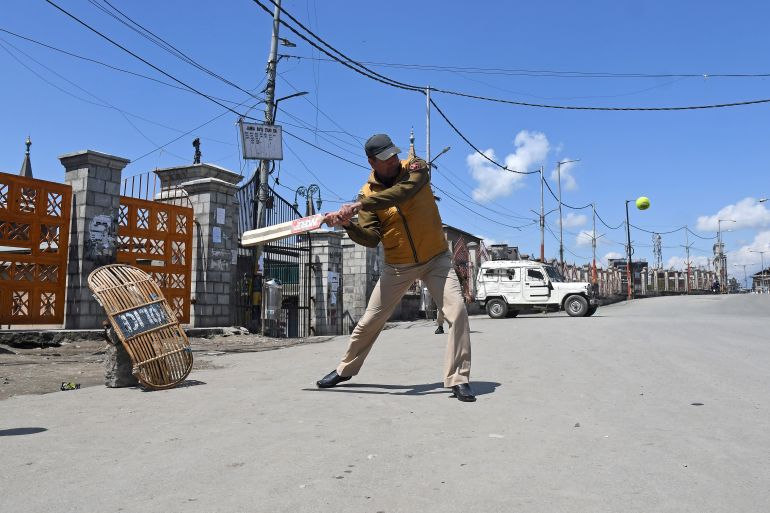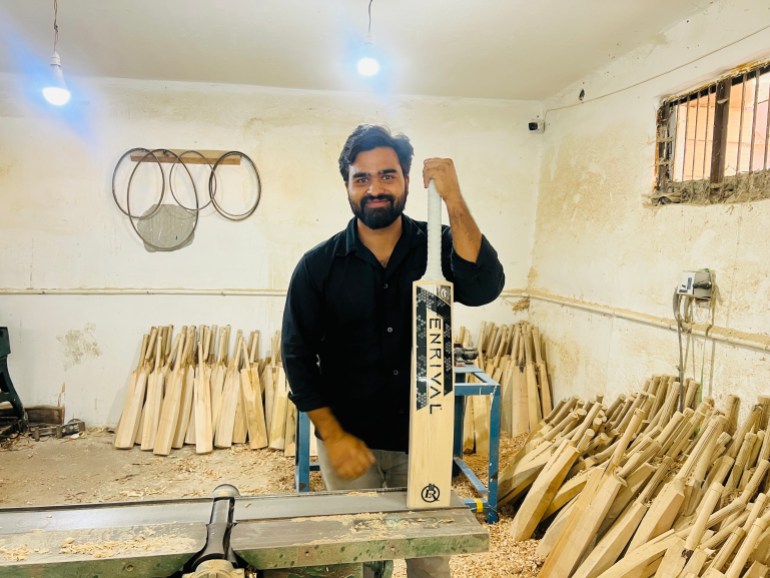In cricket-crazy Kashmir, the India-Pakistan World Cup clash tests emotions
Many people in Indian-administered Kashmir support Pakistan over India in cricket – a risk when the rivals face off.

Indian-administered Kashmir – It’s always a highly charged affair whenever India and Pakistan play each other in cricket, but in the disputed, conflict-torn region of Kashmir, it’s on another level entirely.
As in the past, Saturday’s ICC Cricket World Cup clash between the two countries, held in the northern Indian city of Ahmedabad, brings risks – as well as some opportunities – to residents in cricket-crazed, Indian-administered Kashmir.
Keep reading
list of 4 itemsIndia-Pakistan rivalry: Whatever happened to ‘cricket diplomacy’?
‘The BJP’s World Cup’: India’s Modi wields cricket as a political weapon
Photos: Rampant logging hits Kashmir’s cricket batmakers
Traditionally, most residents in Kashmir have supported Pakistan in every sport. But in cricket, emotions can especially boil over, sometimes leading to protests.
The locals in the Muslim-majority region justify their outbursts by citing the frustrations and pressures of life under the long-standing conflict, calling it the reflection of Kashmir’s “political reality”.
“When it comes to cricket, people mostly support the Pakistan team,” said Musharraf, an avid cricket fan in north Kashmir’s Baramulla town. “The match’s outcome could mean celebrations or otherwise in the region.”
The main bone of contention in India and Pakistan’s rocky relationship is Kashmir; two of the three wars they’ve fought have been over the region.
While both countries administer a part of the divided territory, they both claim the region in its entirety.
In Kashmir, Indian governments have long used cricket as a “loyalty” test for locals, but the pressure has greatly intensified under the right-wing, Hindu-nationalist rule of the Bharatiya Janata Party (BJP), in power since 2014.
“I remember from my childhood days, the celebrations of Pakistan winning the game used to be unique. The fans would burst firecrackers and women would sing in the streets in praise of the favourite cricketers, but all that has changed now,” said 35-year-old Muhammad, a cricketer who has played in five interstate cricket tournaments.
“There are curbs on free expression and one can’t support the Pakistan team openly.”
Since the abrogation of Article 370 in 2019, when the authorities stripped the region of its limited autonomy, there has been a crackdown on dissent.
During every India-Pakistan match, the security and intelligence agencies keep an eye on social media activities – and the surveillance has reached an unprecedented level. Kashmiris now fear that openly expressing their support for the Pakistan cricket team could land them in jail.
The authorities have taken legal action against people posting tweets or WhatsApp statuses favouring the Pakistani team. In some cases, individuals have also been charged under the stringent antiterrorism law the Unlawful Activities Prevention Act (UAPA).
There have also been several instances when Kashmiri students studying outside the region were physically assaulted or arrested after India lost a cricket match to Pakistan. On Friday evening, the Jammu and Kashmir Students Association (JKSA), a local student union, advised students studying in India to refrain from posting about cricket on social media.
Many residents of Kashmir say they will also be more cautious in expressing their feelings during this Cricket World Cup.
“It is impossible to support the Pakistan cricket team even if done in the spirit of sportsmanship. Such support is easily construed as an anti-national act. If the government does not punish us, then random ring-wing users on social media will,” a 32-year-old resident of Srinagar, who did not want to be named, told Al Jazeera.
He said that Kashmiris have been doxxed – whereby private information such as addresses or contact details are posted online – and also suspended or fired from jobs over support for Pakistan’s cricket team.
“Such an intimidating climate automatically forces us to censor our expressions,” he said, before adding that it has not diminished the craze for cricket in Kashmir.
Hope that ‘big matches’ return
Inside Church Lane in Srinagar, a high-security location that houses the residence of the region’s top bureaucrats and officers, young girls and boys are busy playing cricket under the shade of chinar trees at Sher-I-Kashmir Cricket Stadium.
The stadium was named after the first prime minister of Kashmir, Muhammad Sheikh Abdullah, known as “sher” (“lion”) to his supporters, whose National Conference party has ruled for most of the last seven decades in the region
The stadium has held prominent cricket matches – including two one-day internationals – as well as historic political gatherings in the last 35 years.
The first ODI match there was held in October 1983 between the West Indies and India, but was marred with protests when residents hooted and cheered for the West Indies. Some locals also dug up the pitch during the lunch break.
The second international match was played in 1986 between India and Australia where locals cheered for Australia, who won the match.
Even amid its passion for the sport, Kashmir has failed to produce many top cricketers – except for the few such as Parvez Rasool and Umran Malik – which experts blame on the lack of infrastructure and opportunities.
There are many youngsters like high-school student Sameer Farooq, 17, who face challenges and hardships to keep their passion going for the game.
Every day Farooq, from Sursyar village in the central district of Budgam, makes a three-hour round trip to practise in Srinagar, which has better facilities. The round trip costs $2.60; a big expense for his family, as his father earns just $9 a day as a labourer.
“My family is poor and I [often] can’t afford to travel for cricket training or buy a kit. But I am very passionate and believe that good players emerge from small homes,” said Farooq, whose favourite cricketer is Indian star Virat Kohli.
The passion for cricket is no less ardent among the region’s young women.
Armeen Riyaz, 20, who grew up playing cricket with her brother in the streets of Srinagar, home to some 1.4 million residents, practises daily at the local cricket academy.
“When I walk carrying the cricket kit, people think I am wasting my life. But my family supports me,” she says adding, that she dreams of playing in the Indian women’s cricket team.
Meanwhile, the hosting of the World Cup in India also means business for Kashmir’s famed cricket bat manufacturers.
Faizan Mir, 28, who owns a bat manufacturing unit in the outskirts of Srinagar’s Pampore area, says that if India win the World Cup, it will boost his sales as the demand for the bats rises in Indian markets.
“There is a lot of enthusiasm about cricket in India. The sales have already gone up due to the World Cup but if India wins, the sales will triple,” said Mir, who runs a bats and clefts manufacturing company Enrival.
Mir hopes that international matches return to Kashmir.
“I hope the big matches are also played in Kashmir, too.”

On Saturday, at a cafe on the banks of Dal Lake in Srinagar, Indian tourists and local residents were watching the India vs Pakistan match together.
But there was little excitement from the fans of the Pakistan cricket team due to their poor performance.
With the Pakistani team managing a meagre 192-all out after batting first, Kashmiri fans were largely watching the match in silence.
“Pakistan are always unpredictable. This time they played really bad,” said Shameem, a Pakistan fan who came to the cafe with her son.
“They [Pakistan team] spoiled our mood … we will go outside and relax. India played really well.”
However, tourists supporting the Indian team were cheering every ball that Indian captain Rohit Sharma hit.
“We knew our team would bash them [the Pakistan team],” Mahesh Kumar, a tourist from the state of Uttar Pradesh, said, just before India saw out a seven-wicket victory. “This is a double treat to watch.”
